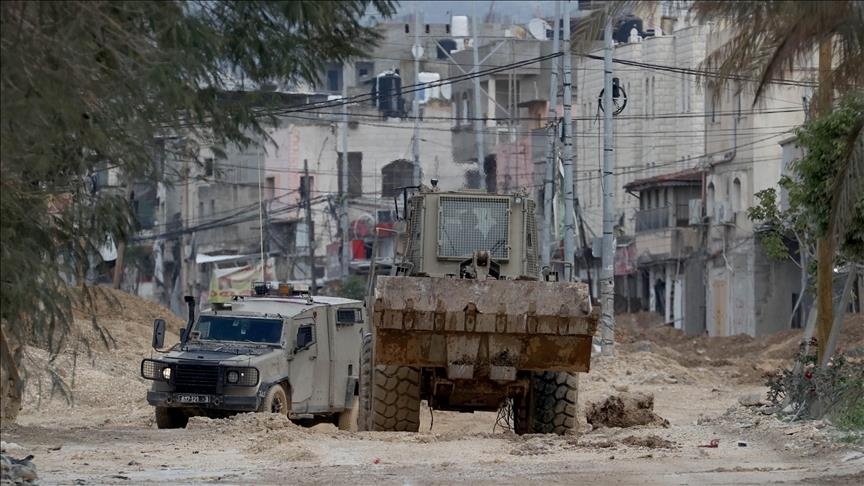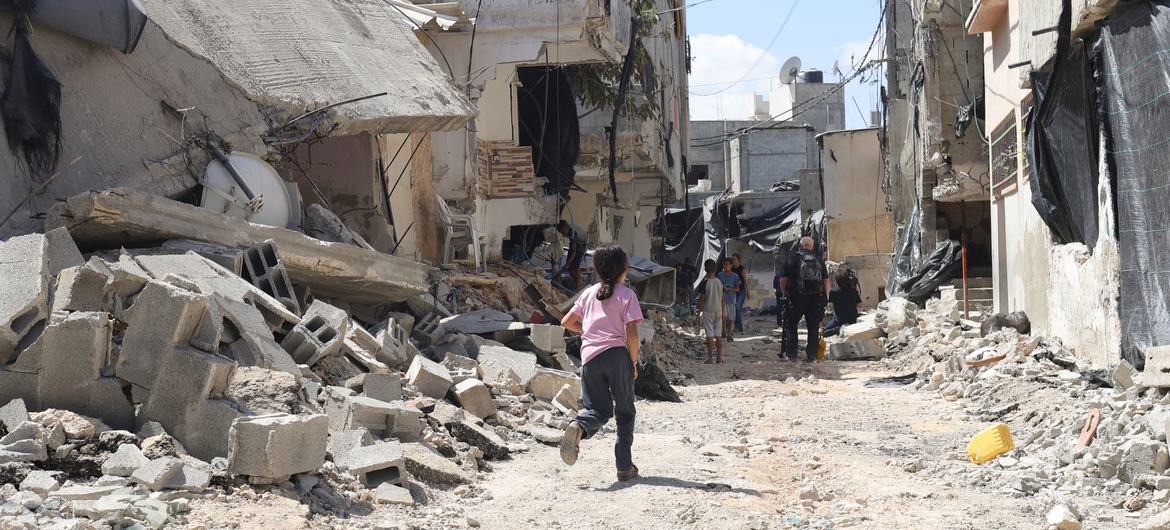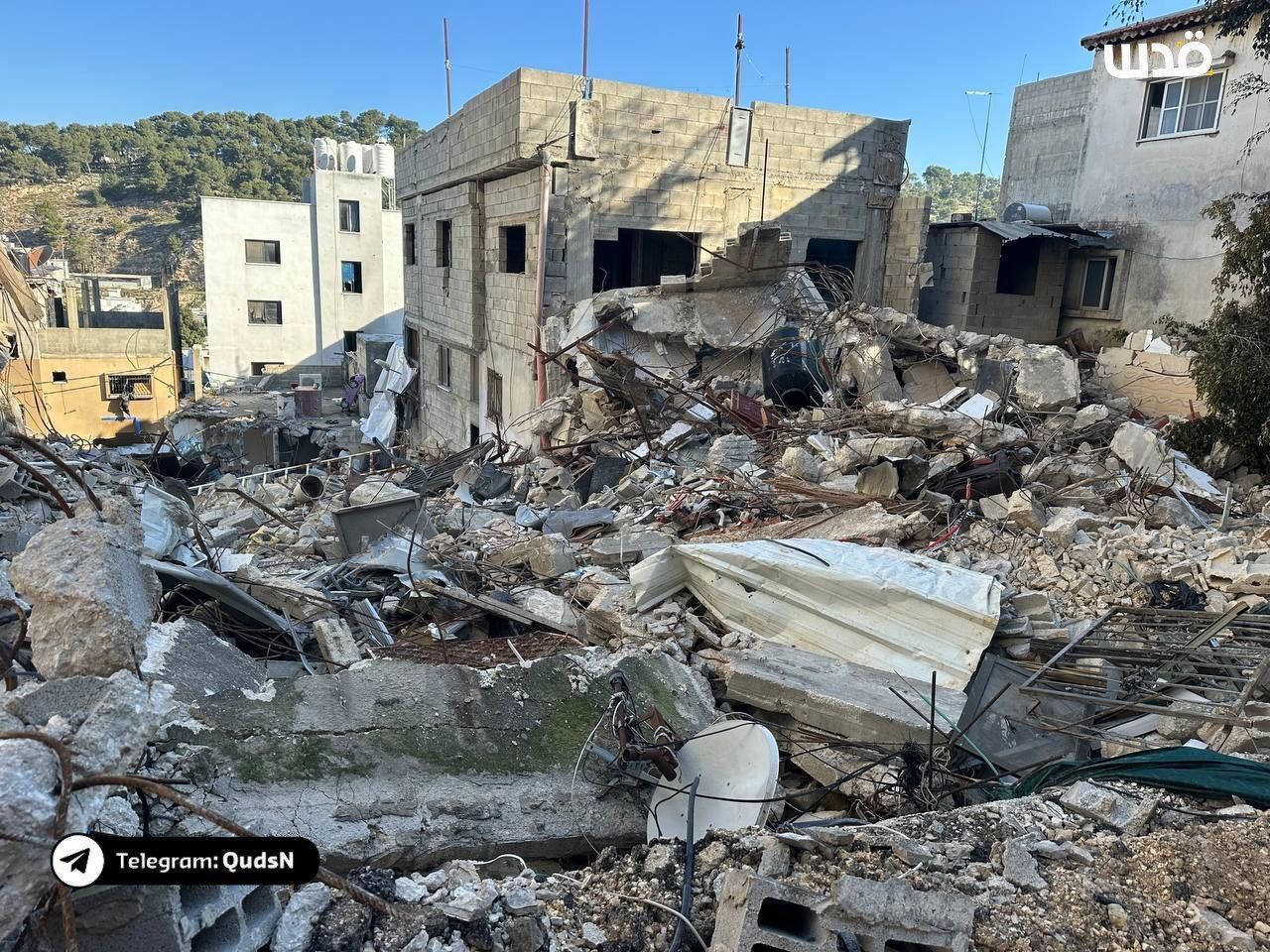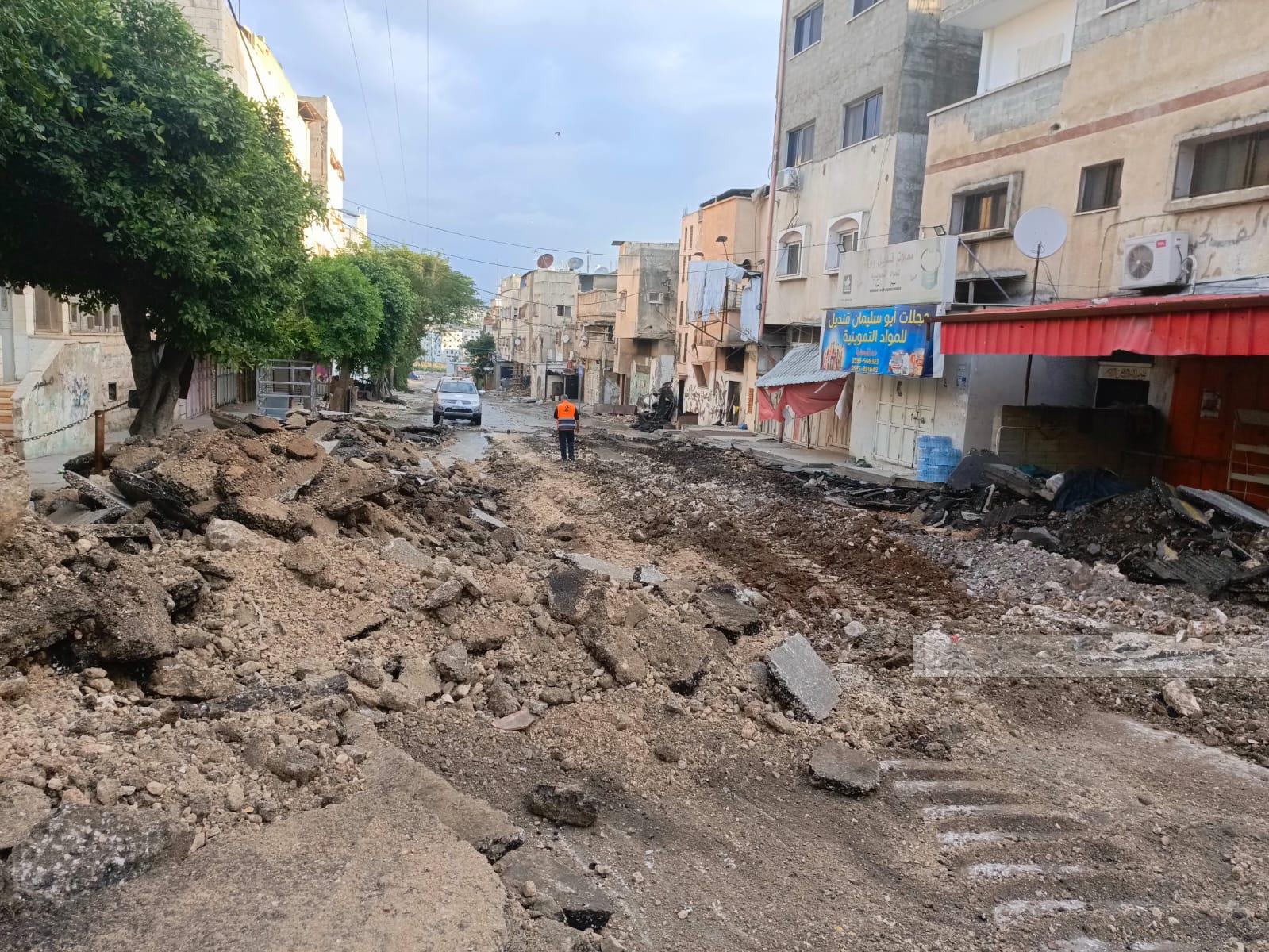Israel Fails in Jenin Despite Massive Onslaught
The Israeli army on Tuesday killed a Palestinian young man in Jenin amid the ongoing offensive in the northern occupied West Bank that has been taking place since Jan. 21.
The Palestinian Red Crescent Society said in a statement that the Israeli army handed over to its medical teams “a martyr in his twenties in the Eastern neighborhood of Jenin.”
Eyewitnesses told Anadolu that a large number of Israeli forces, escorted by bulldozers, broke into the eastern neighborhood of Jenin at dawn on Tuesday.
Armed clashes between the Israeli forces and Palestinian fighters, along with sounds of explosions, were reported in the area, the witnesses also said.
They added that the Israeli bulldozers embarked on destroying infrastructure in the neighborhood, including razing of roads.
The Israeli army has been conducting operations in the northern West Bank since Jan. 21, killing at least 65 people and displacing thousands.
Palestinian authorities have warned that the continued military offensive is part of a broader plan by Benjamin Netanyahu’s government to annex the West Bank and declare sovereignty over it, which could officially mark the end of the two-state solution.
The raids were the latest in the military escalation in the West Bank, where at least 928 Palestinians have been killed and nearly 7,000 injured in attacks by the Israeli army and illegal settlers since the start of the onslaught against the Gaza Strip on Oct. 7, 2023, according to the Palestinian Health Ministry.
The International Court of Justice declared in July last year that Israel’s long-standing occupation of Palestinian territories is “unlawful,” demanding the evacuation of all settlements in the West Bank and East Jerusalem.
Is Israel Re-occupying The West Bank?
Weeks of deadly Israeli military raids in the occupied West Bank have turned Palestinian communities into “battlefields” and left 40,000 people homeless, UN humanitarians warned on Wednesday.
The violence has seen exchanges of fire between Israeli troops and Palestinian militants – and the use of bulldozers in refugee camps for the first time in 20 years which have destroyed public services, including vital electricity and water networks.
Israel’s defence minister said on Sunday forces could remain in the camps for the “coming year”.
Philippe Lazzarini, head of the UN’s Palestine refugee agency, UNRWA, said that “fear, uncertainty, and grief once again prevail. Affected camps lie in ruins…Destruction of public infrastructure, bulldozing roads and access restrictions are common place.”
More than 50 people including children have been killed since Israeli military raids started five weeks ago, the UN agency said, warning that the West Bank “is becoming a battlefield” where ordinary Palestinians are the first and worst to suffer.
Lethal force
Meanwhile, UN aid coordinating office, OCHA, also condemned the “lethal, war-like tactics” being employed by the Israeli military against Palestinian communities in the occupied West Bank.
OCHA confirmed further civilian casualties and mass displacement after a two-day Israeli military raid in the northern town of Qabatiya in Jenin governorate that ended on Monday.
Palestinians were detained in the operation, OCHA noted, before reiterating deep concerns about the use of excessive force against civilians and the additional humanitarian needs among people left homeless.
Responding to needs
UN partners on the ground are doing their utmost to help people uprooted by the violence despite growing “physical and administrative” challenges, OCHA said.
According to the UN World Food Programme (WFP), it reached 190,000 people in January with cash assistance and has provided one-off cash assistance to more than 5,000 displaced people from the Jenin refugee camp.
Gaza cold kills six children
In neighbouring Gaza, UN and its humanitarian partners have continued to scale up food security and livelihood support, while six children reportedly died from the cold.
Needs remain enormous amid desperate humanitarian conditions caused by 15 months of constant Israeli bombardment sparked by Hamas-led terror attacks on Israel that left 1,200 dead and some 250 people captured as hostages.
Citing the Gazan health authorities, OCHA said that six children from the Gaza Strip have died in recent days because to the severe cold, bringing to 15 the total number of youngsters killed by the winter conditions.
Meanwhile, more than 800 trucks entered the Gaza Strip on Tuesday alone, OCHA said. Since the start of the ceasefire on 19 January, WFP has brought more than 30,000 tonnes of food into Gaza. More than 60 kitchens supported by the UN agency across the Strip have handed out nearly 10 million meals, including in North Gaza and Rafah in the south.
The biggest aid provider in Gaza, UNRWA, has reached nearly 1.3 million people with flour and reached about two million people with food parcels since the start of the ceasefire.
The UN Food and Agriculture Organization (FAO) also reported that it has delivered animal feed to northern Gaza for the first time since the escalation of hostilities.
The aid delivery last week has helped 146 families with livestock in Gaza City alongside another 980 in Deir al Balah.
Between the start of the ceasefire and 21 February, FAO distributed more than 570 metric tonnes of animal feed across the Gaza Strip to some 2,300 families with livestock.
OCHA noted in addition that aid partners working in education have identified additional schools in Rafah, Khan Younis and Deir al Balah that were used as shelters for displaced people. “These schools will be assessed and repaired to prepare for their reopening,” it said.
Israel Braces Itself For a New Genocide on The West Bank
The Israeli Defence Minister has ordered the army to take control of three Palestinian refugee camps in the northern West Bank and block residents’ return. Euro-Med Monitor strongly condemns the move, which reveals a serious escalation of Israel’s apartheid and forced displacement practices against the Palestinian people, beginning with the 1948 Nakba.
The Israeli Defence Minister has publicly confirmed the expulsion of approximately 40,000 Palestinian refugees from the Jenin, Tulkarm, and Nur Shams refugee camps in the northern West Bank, citing the need for combat in order to dismantle “terrorist infrastructure” in these areas. What is actually occurring on the ground, however, is the mass displacement of Palestinians from their places of refuge, along with the destruction of their homes, livelihoods, and civilian infrastructure, including water, electricity, and roads. Israel clearly aims to create a new reality that will prevent their short- and long-term return.
The Israeli army’s actions amount to war crimes and crimes against humanity, as they are conducting military operations in ways that flagrantly violate international law, which mandates the protection of civilians and civilian objects and prohibits their targeting or subjection to indiscriminate or excessive attacks. Such repeated and large-scale violations demonstrate Israel’s blatant disregard for its international legal obligations and pose a serious threat to the civilian population in the West Bank. Immediate international intervention is needed to ensure those responsible for these crimes are held accountable as swiftly as possible.
The Israeli army’s deployment of tanks, its establishment of military sites within refugee camps, and its prevention of residents’ right to return reflect a deliberate effort to impose a military fait accompli
Israel’s Ethnic Cleansing

Moreover, the Israeli army’s deployment of tanks, its establishment of military sites within these refugee camps, and its prevention of residents’ right to return reflect a deliberate effort to impose a military fait accompli. These actions violate international law and effectively undermine the agreements under which the Palestinian National Authority was formed.
Euro-Med Monitor’s field team observed the movement of approximately three Israeli tanks late on Saturday evening. The tanks were travelling from Muqeible, near Israel’s Jalamah military checkpoint in Jenin, and positioning themselves near Jenin’s refugee camp, marking the first occurrence of its kind since 2002.
Israel’s deployment of tanks in densely populated residential areas within a purely civilian environment occurred 33 days after its army launched the large-scale “Operation Iron Wall” in Jenin and the Jenin refugee camp, which it later expanded to include Tulkarm and Tubas, leading to full Israeli control over the northern West Bank camps and the destruction of hundreds of homes. This indicates that the deployment of these heavy vehicles serves no security or military purpose, but is instead part of an Israeli attempt to establish military control over the region.
The Israeli army is systematically destroying the aforementioned areas despite there being no military necessity to do so, using bulldozers to pave new roads over the ruins of destroyed homes. Additionally, the army has been instructed to establish military sites within the camps in an apparent aim to alter the geographical reality of these areas and diminish the symbolic significance of the camps, which represent the Palestinian refugee cause following the displacement of Palestinians from their cities and villages in 1948. The presence of the Israeli army in these camps has destroyed any means of livelihood, leaving thousands of residents displaced, living either in temporary shelters or with relatives.
Euro-Med Monitor warns that Israel may attempt to impose a new fait accompli in all areas under Palestinian National Authority sovereignty, effectively breaking the agreements signed with it and nullifying its role in these areas. This could be a step towards annexing the West Bank and imposing Israeli sovereignty by force, which would be in line with the directives of right-wing Israeli ministers who have declared 2025 to be the year for sovereignty over the region.

Official Israeli statements suggest that the military assault will not be confined to the refugee camps in the northern West Bank, but will spread to other areas in both the northern and southern West Bank, putting hundreds of thousands of civilians at risk of death, injury, arrest, displacement, or loss of property.
Israel’s impunity over the past decades was made possible due to international inaction—or complicity—in the face of its crimes of aggression, apartheid, forced displacement, and land seizure over 77 years, as well as the global silence regarding the 15-month genocide in Gaza, has emboldened Israel to intensify and expand its aggression against the Palestinians and the territory it occupies. The ongoing lack of any deterrence or legal consequences increases the likelihood of more crimes being committed by Israel, which poses a serious threat not only to the rights of the Palestinian people but to the stability of the entire international system.
The recent advisory opinion of the International Court of Justice (ICJ) on Israeli policies and practices in the Occupied Palestinian Territory affirms the illegality of Israel’s presence in these areas. The Court confirmed that Israel must end its illegal presence as soon as possible, compensate those affected for their damages, and fulfill its other obligations toward the Palestinian people. The international community must exert effective pressure on Israel to adhere to international law, cease its military operations in the northern West Bank, withdraw from illegally occupied areas, allow residents to return, and halt its decades-long policy of destruction and displacement.
Euro-Med Monitor urges the international community to guarantee the rights of the Palestinian people to live in freedom and dignity; support their right to self-determination under international law; work to end the illegal Israeli occupation and settler colonialism in the Occupied Palestinian Territory; dismantle the system of apartheid and isolation imposed on Palestinians; lift the unlawful blockade on the Gaza Strip; ensure accountability for Israeli perpetrators; and guarantee the right of Palestinian victims to redress and justice.
Israel’s War on Palestine
Israel’s intensification of its military assault against the northern West Bank and its forced displacement of its Palestinian communities marks a dangerous grave violence and human rights violations.
The Israeli army has been conducting the military operation “Iron Wall” in the northern occupied West Bank since January 21, killing until date more than 56 Palestinians and displacing thousands.
The assault came amid rising tensions in the occupied West Bank, where at least 917 Palestinians have been killed and nearly 7,000 others injured in attacks by the Israeli army and illegal settlers since the start of the Gaza war on October 7, 2023, according to the Palestinian Health Ministry.
Since the start of the operation several refugee camps have been nearly emptied of their residents, the largest displacement in the occupied territory since the 1967 Mideast war.
Starting in Jenin Camp, the operation has expanded to Tulkarm, Nur Shams, and El Far’a refugee camps witnessing a comprehensive, Israeli -driven war of destruction that led to the forcible displacement of more than 40,000 Palestinian refugees.
Repeated and destructive operations have rendered the northern refugee camps uninhabitable, trapping residents in cyclical displacement. However, in 2024, more than 60 per cent of displacement was a result of Israeli Forces operations, an increasingly dangerous and coercive environment absent any judicial orders.
Daily reports from displaced residents described a pattern where they were led out of their homes by Israeli security forces and drones under the threat of violence.
They were then forced out of their towns with snipers positioned on rooftops around them and houses in their neighborhoods used as posts by Israeli security forces according to the UN Human Rights Office.
“Leave this place and forget the camp. You will never return. Move now before we destroy it completely,” the Israeli security forces threatened the residents.
Other eyewitness testimonies also recounted similar statements by Israeli security force members who reportedly told displaced residents to “forget” and “say goodbye” to their homes, stressing they would not be allowed to return.
One resident reported being told to “go to Jordan.”
Besides, Jenin refugee camp roads were bulldozed recently with new signs apparently giving several streets Hebrew names, UN Human Rights Office said.
This is happening while statements by Israeli officials persist in communicating open plans to annex the region, empty it of Palestinians, and expel them out of the occupied Palestinian territory.
The use of air strikes, armored bulldozers, controlled detonations, and advanced weaponry by the Israeli Forces has become routine, militarised approach that is inconsistent with the law enforcement context of the Occupied West Bank, where there have been at least 38 airstrikes in 2025 alone.
Moreover, on February 19, the Israeli army has prevented thousands of displaced Palestinians from returning to their homes in the Jenin refugee camp and the
Camp stands empty today, evoking memories of the second intifada.
This scene stands to be repeated in other camps.
On the other hand, accompanied by soldiers, Israeli Prime Minister Benjamin Netanyahu entered a Palestinian home in the Tulkarem refugee camp in the northern West Bank on February 21, announcing a new military operation in the occupied West Bank.
“We are destroying entire streets, eliminating militants, and I have instructed reinforcements in the West Bank along with additional military operations,” Netanyahu said in a recorded statement from Tulkarem, released by his office.
Earlier on the same day, the Israeli army announced the deployment of three additional battalions to the occupied West Bank following Netanyahu’s directive for a “strong operation.”
All this is a part of a plan to uproot Palestinian refugee camps, similar to the events that took place in Gaza and reminiscent of the 1948 Nakba.
This lines up with Israel’s vision of a war declared since a long time on the UNRWA, the United Nations Relief and Works Agency for Palestine Refugees which has reached the climax during the war on Gaza.
Under the Knesset laws implemented on January 30, UNRWA no longer has any contact with the Israeli authorities, making it impossible to raise concerns about civilian suffering or the urgent need for the delivery of humanitarian assistance which puts at grave risk the lives of Palestine Refugees and the UNRWA staff that serve them too.
UNRWA reiterates that civilians and civilian infrastructure must be protected at all times and that collective punishment is never acceptable.
There are about 912,879 registered Palestinian refugees in the occupied West Bank, around a quarter of whom live in 19 refugee camps mostly densely populated camps, located next to major towns and others are in rural areas, according to UNRWA.
Israel views these camps as incubators of armed Palestinian struggle, as it seeks to eradicate the refugee issue and the right of return.
Any forcible transfer in or deportation of people from occupied territory is strictly prohibited and amounts to a crime under international law.
Rather than abide by these rules, Israel has openly defied international law time and again, inflicting maximum suffering on civilians in the occupied Palestinian territory and beyond.
Displaced Palestinians must be allowed to return to their homes and Israel must comply with its obligations under international law, which include ending its unlawful presence in the Occupied Palestinian Territory as rapidly as possible and evacuate all occupied West Bank settlements.
In the meantime, as the occupying power, Israel must ensure the protection of Palestinians, the supply of their basic needs, and the respect of their full range of human rights.
Najla M. Shahwan is a Palestinian author, researcher and freelance journalist. Author of thirteen books in literature and a children story collection. Chairwoman of the Palestinian Center for Children’s Literature (PCCL). Founder of Jana Woman Cultural Magazine. Recipient of two prizes from the Palestinian Union of Writers.











